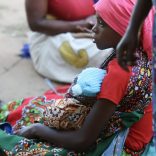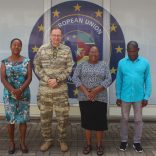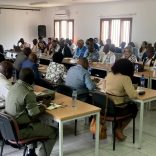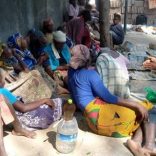Mozambique: 50 thousand families need food assistance in Sofala
Covid-19: The psychological trauma and hidden scars in Maputo

Polana-Caniço General Hospital welcomes patients with Covid-19
- Many residents of the Mozambican capital are in a panic because they see personalities, neighbours, friends and relatives dying of Covid-19. Psychologists have identified people with mental problems arising from fear and restrictions.
People in the city of Maputo are receiving psychological counselling because of the panic, the restrictions and the suffering generated by the Covid-19 pandemic, psychologist Édio Tsambe, assigned to the Covid-19 Isolation and Treatment Center at Polana-Caniço General Hospital says.
“Fifteen individuals [receiving psychological counselling] who have recovered from the coronavirus, but who have mental problems such as psychosis, depression and moderate anxiety. These are individuals who have been hospitalised and who have had a mental health diagnosis that requires medical care outside of hospitalisation,” the psychologist says.
Filónia, 26, tested positive for the coronavirus and was hospitalised for two weeks. Although she has recovered from her illness, now she is afraid to return to the hospital. “It gives me a feeling of fear, it gives me a lot of pity, because of the behaviour we saw outside and then we are admitted here,” she says.
“I have more attention on preventing myself than others who have no experience. I know that I cannot touch certain places or sit in some places. I am afraid that others will not do that,” she says.
“It was scary”
Maria de Lurdes and her 11-year-old daughter were also admitted to the Polana-Caniço General Hospital for two weeks after they contracted the virus. “When I heard it, I thought it was a joke, but this disease really kills,” she says.
“I was scared and really very scared when I heard that I had contracted the disease. I ran out of strength. And I want to advise all mothers to take good care of their children and not to let them out,” she says.
Even health professionals do not escape. Nurse Yonisse da Nélia was infected at work and admits she was scared when she tested positive.
“It was scary, but with the support of psychologists I was able to deal with the situation because as soon as I tested positive, I was accompanied by health professionals. Every day I received calls from psychologists,” she recalls.
“In my family it was a scary thing, but as soon as I followed all the medical guidelines they were able to adapt as well. Here at any time I can be re-infected but I redouble my efforts to protect myself.”
Panic and fear in families
Clinical psychologist Édio Tsambe says that the panic and fear in families makes sense for the way a patient should be treated.

“When we isolate someone, we are taking this person away from family life, from social life, we are completely changing a routine. So,it is necessary to have a lot of empathy, to know how to put yourself in this patient’s place, recognise the patient’s fears and follow their condition closely,” he adds.
Tsambe warns that, if the numbers remain high, Mozambique may become a traumatised society that will need to undergo a healing process – especially those who were infected with the coronavirus and recovered.
“Those who are in a panic are those who have isolated themselves, in the extreme sense. They are afraid to go out on the street, to buy bread, are afraid to adapt their lives to the new reality. They are afraid of contact, they have isolated from close friends and family. some end up with obsessive compulsive disorders and excessive hygiene,” he says.
Mozambique has already crossed the barrier of 50,000 positive cases of coronavirus since the disease first arrived in the country in March 2020.












Leave a Reply
Be the First to Comment!
You must be logged in to post a comment.
You must be logged in to post a comment.